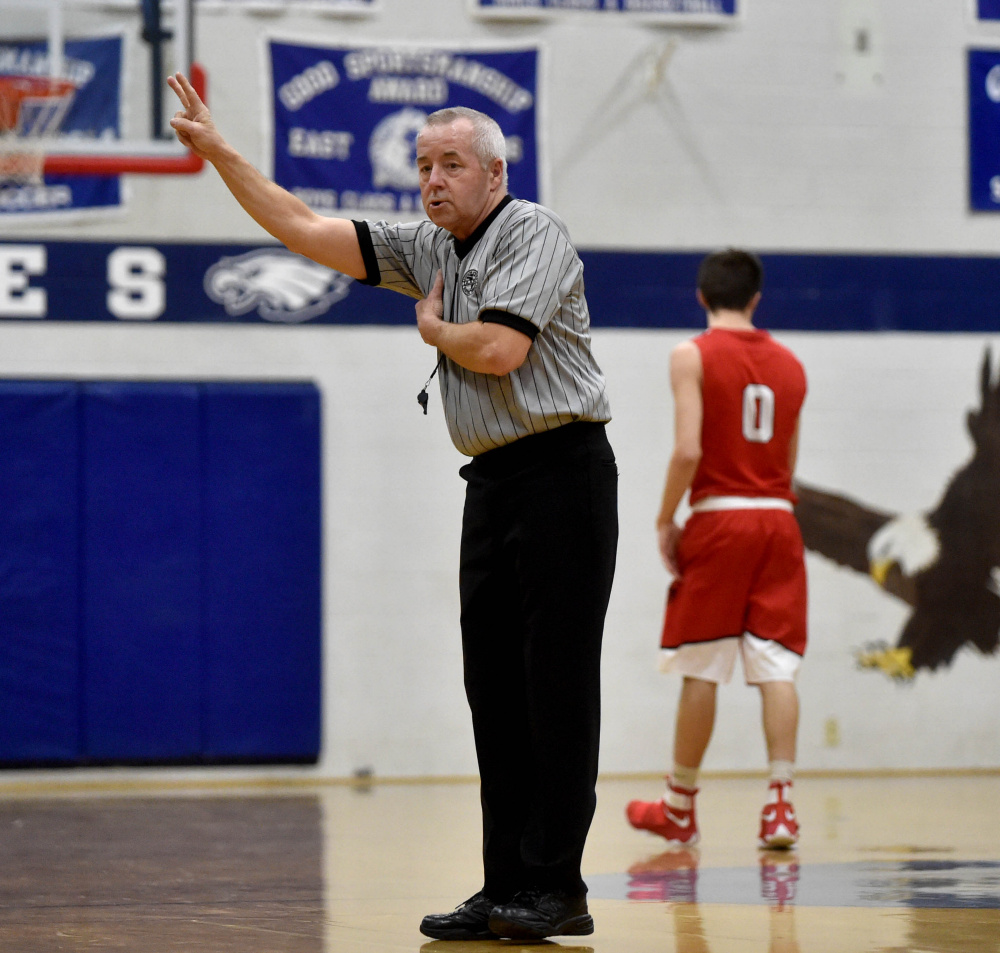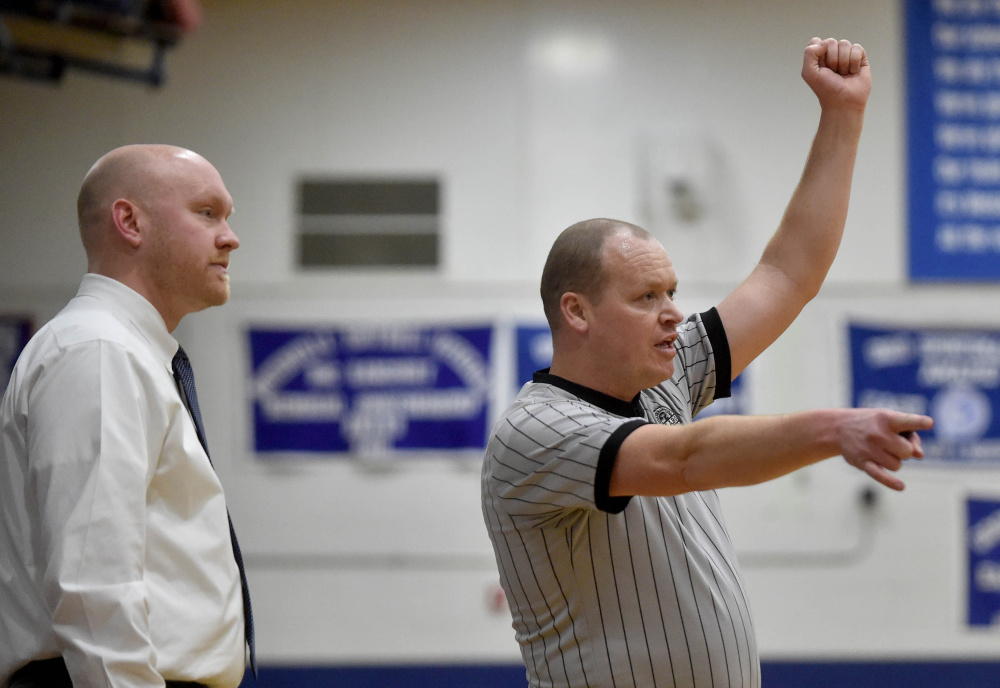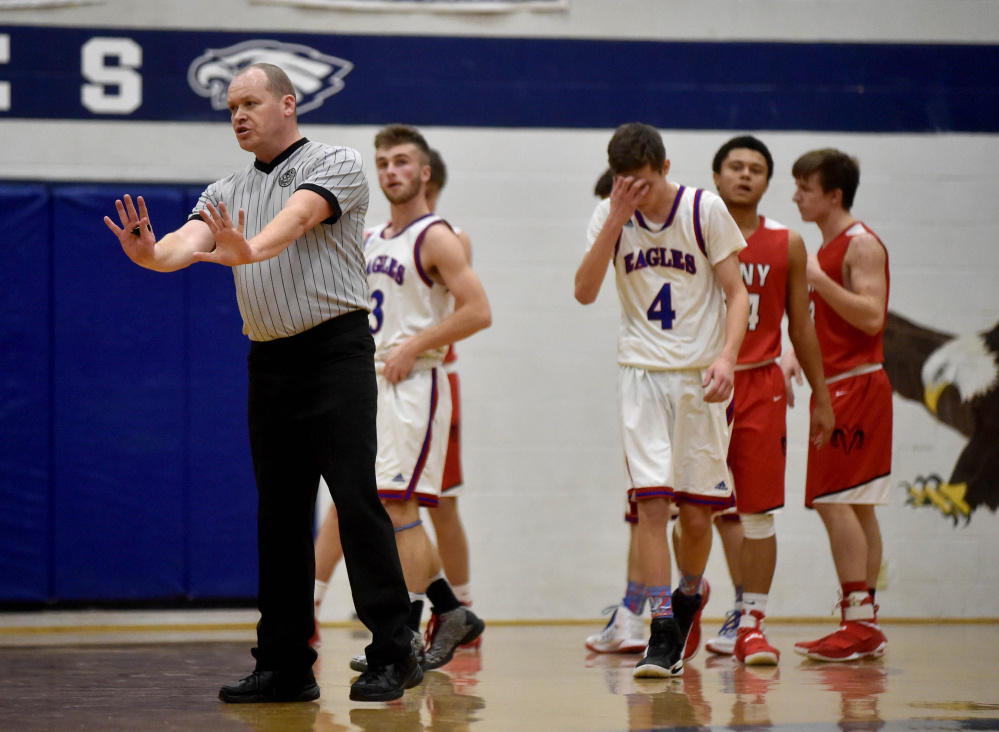Frustration spilled out of Skowhegan Area High School girls basketball coach Mike LeBlanc after Thursday’s loss to Nokomis. Not because his team lost, he knew the Warriors were a very good team and also didn’t expect his Indians to run the season undefeated. LeBlanc’s frustration was directed at the officiating situation.
With a shortage of basketball officials this season, two officials worked not only the varsity game between Skowhegan and Nokomis, but the preceding junior varsity game, too.
“I don’t think it’s fair to us or Nokomis to have officials do both games, with an 8-0 team and a 7-1 team. We should have had different officials,” LeBlanc said. “I’ve already spoken to (the officials). They did a fine job. I just don’t think it’s fair they’re doing that to certain teams. That’s twice we’ve had that.”
This basketball season, the issue that frustrated LeBlanc is becoming more common. Throughout the state, high school and junior high school basketball has seen a drop into the number of officials. It’s a problem that’s been building for a few years, Peter Webb, the state basketball commissioner said. The lack of officials hasn’t reached a critical point yet, Webb said, but the problem is trending that way.
“Right now, it’s a concern. If it changes more, we’re talking about putting it in the issue category,” Webb said.
At its peak a few decades ago, the state had approximately 700 officials to work varsity, junior varsity, and middle school games. Now, there are just under 500 working officials in Maine, Webb said.
“We’re best off with 600, 650 officials,” Webb said.
It’s not a problem confined to the state’s most rural areas. Webb acknowledged that the Western Maine board, which provides officials to schools in Androscoggin, Cumberland, York, Oxford, and Sagdahoc counties, is in the best shape, in terms of the number of officials, but still has a shortage. Central Maine, serving Kennebec, Franklin, Lincoln and Somerset counties, and Eastern Maine, serving Hancock, Knox, Penobscot, Waldo, and Piscataquis counties, are down the most, Webb said.
“Those boards each could use 25 more officials,” Webb said.
The Downeast board of officials and Northern Maine board also have been affected by the shortage, Webb said.
T.J. Halliday has been a basketball official for 32 years, and now serves as head of the Central Maine board. At a fall meeting, Halliday asked for a show of hands.
“I asked those with five years or less experience to raise their hands,” Halliday said. “Fifty to 60 did. We’re taking a 20, 30 year veteran and replacing them with someone with much less experience.”
The state, particularly central Maine, has been hit by a number of veteran officials retiring in recent years, and with fewer newcomers stepping in, there are fewer officials qualified to work varsity games. Halliday said the problem was compounded in central Maine when the area’s two largest conferences, the Kennebec Valley Athletic Conference and Mountain Valley Conference, began scheduling games on the same nights.
“Part of the bigger problem is a concentration of games on particular nights. With boys and girls games on the same nights, it makes it harder to cover every game,” Halliday said.
Tom Hill, the athletic director at Messalonskee High School, said his girls program has had the same officials work both ends of a junior varsity-varsity doubleheader three times this season. Winslow boys basketball coach Jared Browne said his team has had refs work the double shift twice this season. Browne pointed out that each time, he felt the officials did a good job, with no glaring missed calls, but added that extra work could wear down officials working too much over the season.
“They have a tough enough job as it is, and to ask them to do two games, it’s not fair to them,” Browne said. “I think they’re doing a good job in a tough situation.”
Working back-to-back games happened in the past, Webb said, but it was rare.
“It’s probably happened several dozen times, and that’s too much,” Webb said.
While running the court for 64 minutes to work consecutive games is physically daunting, that’s not the biggest concern with back-to-back games, Halliday said.
“It’s not even the physical aspect. It’s the mental aspect. It’s hard to concentrate that long,” Halliday said.
Webb cannot point to one reason fewer people are showing interest in becoming an official, but he noted a few key points. First, it’s difficult. Prospective officials must first enroll in a class. The class runs five weeks in October and November and costs $60, Halliday said. From there, new officials must work their way up, progressing from low level games. If they’re competent there, they can advance eventually to varsity games. There are 26 people currently enrolled in the central Maine education program, Halliday said.
“We’ve had fewer and fewer people interested in taking the course. These numbers have been down over the last several years,” Webb said. “It takes time to take the course, time to get experience.”
Some take the course, not realizing how much goes into officiating a basketball game. It’s not as easy as it looks.
“Some of my former players have taken it, guys who are smart and know the game, and they say they’re barely getting 50 percent of (the questions),” Browne said.
Even veteran officials are required to attend classes and workshops each year, in order to learn new rules and brush up on old ones.
“They don’t realize the commitment that it is. There’s a lot of continuous education. It’s not a matter of each fall of getting out your suit and finding your whistle,” Webb said. “I’m not sure people who pursue it have the patience. They say ‘When are my games?'”
Webb added that in years past, 19-21 year old made up a greater portion of new officials. In recent years, however, that demographic has migrated to officiating less.
“That age group has been a void for a number of years,” Webb said.
There’s also the perception that officials take almost constant verbal abuse from fans and coaches. That viewpoint is not unwarranted. For example, during the Nokomis-SKowhegan varsity girls game on Thursday, a fan loudly questioned the sobriety of the officials. Halliday said most officials quickly grow a thick skin and tune it out, or in a loud gym, never hear the barbs in the first place. Halliday noted the crowd noise at a Cony-Gardiner boys game he recently officiated, and said all he heard was a roar.
“We are human. There’s no way to be perfect out there. There’s 10 moving parts in a small space,” Halliday said.
Sitting in the stands, though, among the insulters, you hear more, and that can make a potential official decline to give it a go.
“They go to games and hear the yelling. Officials are used to it. But for somebody thinking about becoming an official, they think ‘Why would I do that?'” Webb said.
Added Browne: “It’s a commitment. I know I can get vocal at times, and I think a lot of people don’t want that kind of pressure.”
The high school basketball season is compact. This season, opening night was Dec. 9, and the final day of the regular season is Feb. 9. Subtract Sundays (Maine Princiapal’s Association rules prohibit Sunday games), and that leaves just over 50 days in which to play the season. Factor in weather postponments, and games begin to stack up, making the officials shortage even more pronounced.
The lack of officials is a problem that doesn’t have a quick fix. Unless more people sign up to take the course, and stick with it to gain the experience to work varsity games, it’s a trend that will continue, Webb said.
“We have to do something to garner some attention. It’s a good time to look into becoming an official,” he said.
Browne said coaches, players and fans need to realize the officials who are working are doing the best they can in a tough situation.
“They’re all in it for the right reasons, and with this shortage, we all have to make the best of it,” Browne said.
Travis Lazarczyk — 861-9242
Twitter: @TLazarczykMTM
Send questions/comments to the editors.






Success. Please wait for the page to reload. If the page does not reload within 5 seconds, please refresh the page.
Enter your email and password to access comments.
Hi, to comment on stories you must . This profile is in addition to your subscription and website login.
Already have a commenting profile? .
Invalid username/password.
Please check your email to confirm and complete your registration.
Only subscribers are eligible to post comments. Please subscribe or login first for digital access. Here’s why.
Use the form below to reset your password. When you've submitted your account email, we will send an email with a reset code.